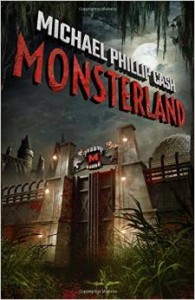
Michael Phillip Cash
October, 2015
Reviewed by Michael R.Collings
Monsterland is not Michael Phillip Cash’s best-written novel — there are several long passages of exposition near the beginning that threaten to slow the pace too much and, paradoxically, in other places the narrative seems to jump, as if it had been rushed to completion.
The reason for these lapses, I think, relates to the passion that Cash brings to the themes Monsterland develops, themes that are critical to our society right now, themes that suggest that there are problems out there that must be resolved. They might not involve werewolves, vampires, and zombies, as is the case in the novel but they do involve real-world analogues standing behind the metaphors and giving them power and solidity.
To all appearances, Vincent Conrad is an international philanthropist, spending great sums of money to establish six Monsterland theme parks around the world — a world in economic crisis because of a run-away virus that transforms its victims into zombies. His plan: to create a series of sanctuaries for the afflicted where they may be studied and, eventually, a cure found. Add to the vitality challenged the remnants of two ancient species that have lived hidden among humans, vampires and werewolves, to build enormous (and enormously expensive) enclaves that will bring employment and stimulate a stagnant global economy, and provide opportunities for the rest of humanity to visit and observe the monsters … and voilà, instant world-wide stability for governments and politicians, and bread and circuses for the common people.
What could go wrong?
Of course, as theme-park novels and films from Westworld (1973) to Jurassic World (2015) can attest, the answer to that question is: Everything.
When Wyatt Baldwin, his younger brother, Josh; and several school friends unexpectedly receive VIP passes to the star-studded, spectacular opening night of Monsterland, they are at first thrilled. Only Wyatt’s stepfather, Carter White, shows any hesitation about attending, but he is forced to do so because of his job as security officer.
At first, all goes well. The friends split up to visit the three main attractions: Vampire Village; River Run, complete with werewolves; and Zombieville. Then, gradually but inexorably, each of the young people discovers that there are hideous secrets in Monsterland … and that the captive creatures may not be the only — or even the worst — monsters involved.
Cash uses this setting and the generally metaphorical nature of horror creatures to make some penetrating comments about contemporary life and problems. It is not a far reach to see behind the zombies the images of refugees and immigrants, torn from their normal lives and compelled to live in fenced-in camps lest, by their very numbers, they threaten to overrun cities and states. Nor is it a far reach to see the werewolves and vampires as suggesting any number of isolated groups that have been ostracized from society and constrained to keep essential parts of themselves secret.
Coupled with those comments are more overt ones about the self-serving nature of politics, the fundamental horror of overweening greed for wealth and power, the conception of certain elements of humanity as lesser than others, and the artificiality of recreated worlds as they appear in theme parks.
Taken together, all of these points make Monsterland an intriguing read, one that provides a solid narrative, intriguing characters capable of growth and change, an ideal setting as backdrop, and an underpinning of fervent social consciousness transformed into story.
- Killing Time – Book Review - February 6, 2018
- The Cthulhu Casebooks: Sherlock Holmes and the Miskatonic Monstrosities – Book Review - January 19, 2018
- The Best Horror of the Year, Volume Nine – Book Review - December 19, 2017
- Widow’s Point – Book Review - December 14, 2017
- Sharkantula – Book Review - November 8, 2017
- Cthulhu Deep Down Under – Book Review - October 31, 2017
- When the Night Owl Screams – Book Review - October 30, 2017
- Leviathan: Ghost Rig – Book Review - September 29, 2017
- Cthulhu Blues – Book Review - September 20, 2017
- Snaked: Deep Sea Rising – Book Review - September 4, 2017


